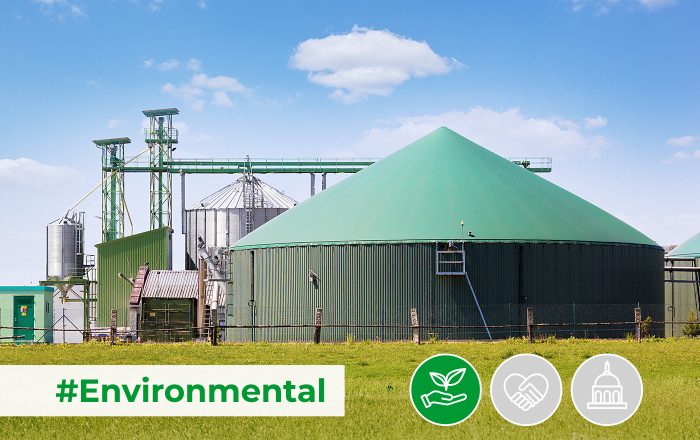Gas TSO of Ukraine proposes changes to regulations to support the development of the biomethane market to strengthen the energy security of Ukraine. We strive to accelerate the realization of the significant potential to produce biomethane on a large scale in Ukraine, as it can help overcome the energy challenges of Ukraine and Europe.
Biomethane is an analog of natural gas, which is carbon neutral. It can be used to produce heat and electricity as a fuel for transport and raw materials for the chemical industry. Today, biomethane is the cheapest and most affordable renewable gas that could be Ukraine’s response to russia’s influence on the energy security of Ukraine and Europe. Ukraine could already export biomethane to the EU through existing gas pipelines, which does not require investment in upgrading or creating additional infrastructure.
According to experts, Ukraine has significant potential for biogas production – up to 8 bcm per year. As of June 2022, 26 companies planning to produce biomethane in Ukraine at 206 million cubic meters per year contacted GTSOU.
Our gas network with three transit corridors and backup gas pipelines is connected to the European gas grid and is ready for biomethane injection. Biomethane producers can connect to gas networks in most of Ukraine’s territory without modernizing the gas pipelines. Besides, it makes the physical or virtual delivery of biomethane and other renewable gases from Ukraine to Europe possible and their use for the needs of Ukrainian consumers.
The potential development of the biomethane market depends on several needs and regulatory factors that form the prerequisites for its growth. Last year the Verkhovna Rada of Ukraine adopted a law on the development of biomethane production, but two key issues remained on the stage of solving:
- adoption of the Technical Regulations on Natural Gas in terms of increasing the permissible limits for oxygen (O2) content in biomethane;
- launch of a biomethane registry to ensure the issuance of biomethane guarantees of origin.
Note that for potential producers, the question of the acceptable oxygen level (O2) in natural gas, when fed into the network, is fundamental since this indicator significantly affects the investment attractiveness of projects.
At the same time, the draft of the Technical Regulation on Natural Gas provides for relatively wide limits of permissible concentrations – from 0.02% (by default) to 1% (subject to agreement with network operators). And these provisions come into force only 18 months after the Technical Regulation on Natural Gas publication date, thereby significantly delaying the development and implementation of biomethane production projects in Ukraine.
At the same time, the cost of after-treatment for biogas at the levels of 1%, 0,2%, and 0,02% differs significantly. It can be critical regarding project payback and the attraction of the necessary investments.
The most promising is the connection of biomethane producers to low-pressure networks – the gas distribution system, since this, on the one hand, reduces the customers’ expenses on the installation of additional equipment to increase pressure for supply to the system, and on the other hand, does not threaten the violation of gas quality requirements at interstate points under the existing contracts. Also, it will not decrease the quality of gas supplied to underground storage facilities and industrial consumers having oxygen-sensitive equipment.
At the same time, such producers will be able to use the Ukrainian gas transportation system to export biomethane to any exit point in Ukraine and the EU in the future on a parity basis.
Therefore, an additional government incentive will be to reduce the requirements for the mole fraction of oxygen content to feed gas into the gas distribution networks to 1% by default.
Therefore, to accelerate the development of the biomethane market and strengthen the energy independence of Ukraine, GTSOU proposes to define the content parameter of mole fraction of oxygen (O2) at a 1% level by the relevant regulations when connecting producers to gas distribution networks, and to reduce the envisaged 18 months period for entry into force of the requirements for oxygen content and adjust the GTS Code under the changes introduced.
“Gas TSO of Ukraine, for its part, expresses full support and is ready to render the services of biomethane transportation, including to Europe, as well as to join projects aimed at realizing the potential of biomethane. Regulatory changes will accelerate the development of the industry. Supporting the projects that contribute to the energy security of Ukraine, development of new energy sources is a significant contribution to the future of our country,” said Sergiy Makogon, CEO of GTSOU.
